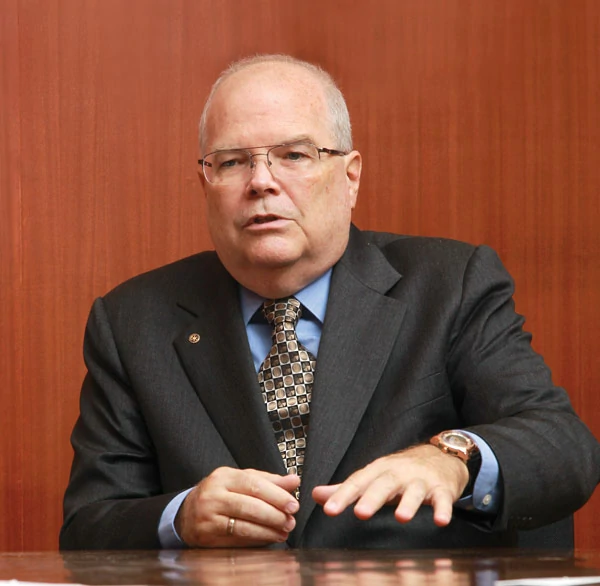
It is not an unusual occurrence that working adults, in Sri Lanka, today, do not have the time or the means of securing an education that may determine a brighter and more aspiring future to assist them, to reach new heights, in their respective business environments. AIMS College in Colombo has been in operation for 23 years, and together with prominent universities in the United States, conducts unique, globally accepted programmes for those who wish to continue to strengthen their qualification background to keep pace with the ever-changing business world.
By Sonali Kadurugamuwa
Photography by Mahesh Prasantha
A reputed institution in the IT sector in Sri Lanka not only for providing IT education, but also for providing hardware and software solutions. The AIMS IT Training Centre was inaugurated in 1987 with just two students, two computers and one instructor. Today, it has grown into a large educational institute with branches in Negombo, Gampaha, Wattala, Chilaw and Colombo; each comprising 500 to 600 students. The centres offer programmes in IT and English language for students from kindergarten classes to A/Ls.
A division of AIMS Group, AIMS College of Business and Information Technology began in early 2004 with an ‘aim’ to host Bachelor’s, Master’s and even PhD level programmes for working adults as an additional credential to their portfolios. Since then they’ve seen over 50 students graduate, with their degree programmes. “Bachelor’s degrees have become a very basic qualification for entry level jobs and that is why we concentrate on areas such as this to assist our students to achieve targeted objectives,” adds Dr Kithsiri Manchanayakke, Chairman, AIMS College, on how students benefit from their programmes.
Dr Manchanayakke believes that AIMS runs a non-traditional system of university education, as their degree programmes are made for working and busy people, in an extremely flexible environment yet delivering the same standards of quality education when compared to any conventional university, anywhere in the world. He also goes on to explain that with the Higher National Degree programmes in Business Management and Computing completed at AIMS, students can continue on to “top up” those degrees in universities, affiliated with them, in the US and UK. Speaking of the teaching methods at AIMS, Dr Manchanayakke says that lecturers from relevant industries are invited to the College to address study sessions with regard to real industry situations of the day-to-day working environments, which gives the students practical knowledge about the nature of an industry related setting, plus, he continues, “we have many students from different backgrounds of working environment and they all participate in giving different points of view, which is a great insight during presentations and assignment work for relevant subjects.”
“When Students Come To Graduations There’s A Rapid Exchange Of Business Cards, Deals Are Made Including Sales And Promotions.”
Introducing Preston University in the US as one of their affiliated schools, Dr Manchanayakke explains that Preston provides guidelines and lecturing standards for AIMS College and has to have lecturer profiles and syllabi approved by Preston University before implementing it into context. “AIMS reflects the standards and quality of our global university,” adds Jerry Haenisch, Chancellor of Preston University about the AIMS and Preston collaboration. According to Chancellor Haenisch, Preston is an international university and its partner locations are worldwide, catering to students in the same calibre of diversity with consistent styles of learning, practical and applied approaches to education, quality textbooks published in the US and republished in other countries to make them affordable and using local talent of professors as lecturers from local colleges. “Our student body comprises of working adults who cannot attend traditional universities because of time or family or working constraints.” He further reflects that Preston offers students an alternative to those constraints with flexible class times and sets prices in each country according to the economic conditions of those countries. For example; the students in Sri Lanka would pay a typical private school rate or tuition and not US university rates. “We will be having an international graduation ceremony in the US and for those students who cannot afford the travel costs or arrange visas to the United States, I will travel to our various partner locations for local graduations so the students can feel a presence with Preston University.”
Chancellor Haenisch says that the university, in future will welcome student exchange programmes to institutes where similar courses are taught and because these students are working adults, they may attain potential business connections or strengthen existing ones and in turn create a network with other working students. “When students come to graduations there’s a rapid exchange of business cards, deals are made including sales and promotions,” he emphasises. He believes that in doing so, the students will be establishing a worldwide network of apprentices with common foundations of education and an equally universal philosophy toward business and education – can work together with trust, friendship even build social bridges between countries, which in turn will develop economies.
With regard to future courses of study, Dr Manchanayakke is working alongside Government ministries, as they too, he says, “are keen on private universities such as AIMS College being established in the country, and we’ve even started up an online library with the Ministry of Education.” He also believes that “hacking” is a growing issue of concern and hence AIMS has collaborated with EC Council of the US to begin a Master of Security Sciences programme as “it will be in great demand in the future.”
On an end note, Chancellor Haenisch says that challenges for universities everywhere is to establish their credibility and it is especially critical for non traditional schools “so we are always striving to demonstrate that our standards are equally as high as any traditional school in the US.”






